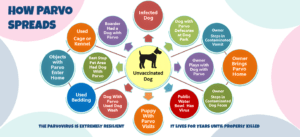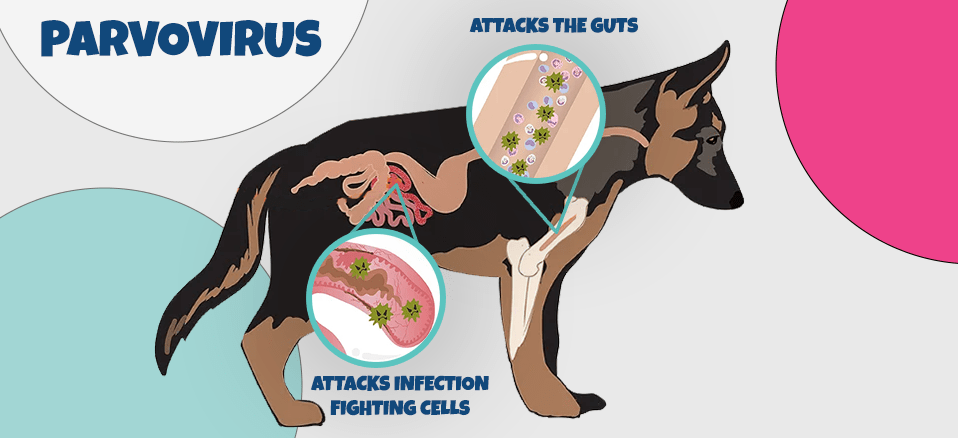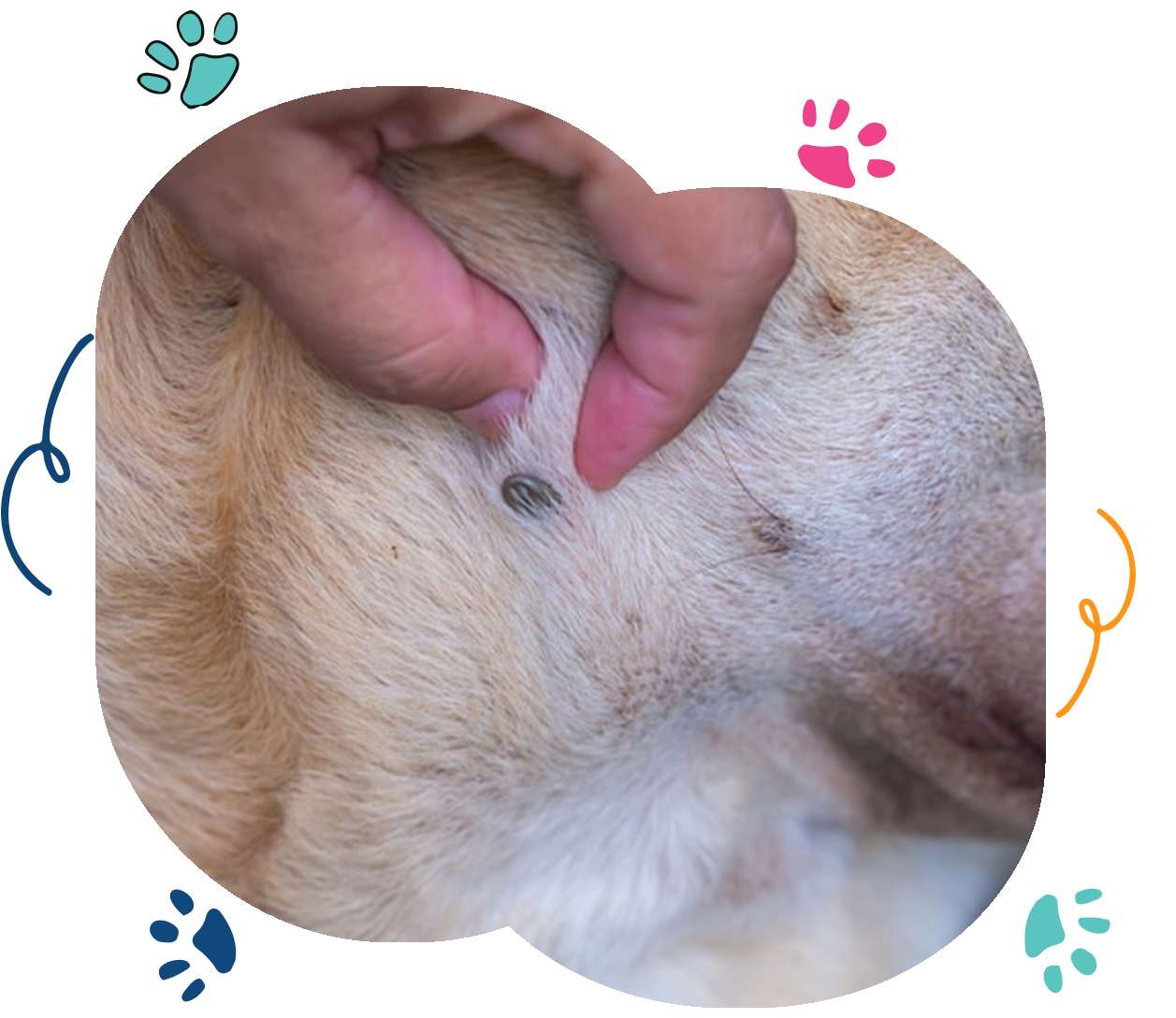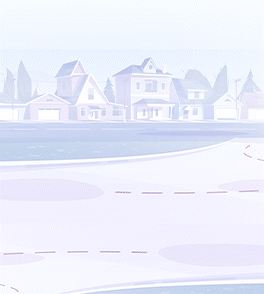Our minds are full of questions about whether the parvovirus is contagious and how dogs are infected with it. How do dogs act when they have parvo? The purpose of this page is to address all the concerns you may have about parvovirus.
What is Parvovirus?
Parvovirus (also known as CPV, CPV2, or Canine parvovirus) is a highly contagious virus mainly affecting dogs. Parvovirus may infect other mammals including foxes, wolves, and cats with different strains of parvovirus. It is spread from dog to dog by direct or indirect contact with their feces. A fatal and contagious viral infection affects dogs with a mortality rate of 91% in untreated cases. The Parvovirus attacks rapidly dividing cells in a dog’s body and severely affects the cell lining on the inside of the intestine, the cells inside the lymphatic system, white blood cells, and the bone marrow cells.
How do dogs get Parvo?
A highly contagious and fatal disease affecting a dog’s digestive and cardiac system. Dogs get the Parvo virus when unvaccinated sick puppies’ poop or contaminated soil is ingested by your dog because unvaccinated sick puppies’ poop has millions of virus particles. These virus particles are very stable in the soil and very resistant to cold and heat. The virus particles present in the soil can stay there for years and when unvaccinated puppies or dogs walk in the soil or lick their containment paw they ingest the virus and get Parvo.

12 Symptoms of Parvovirus
Parvo is a highly contagious viral disease that can lead to the death of dogs. The symptoms of this disease are mentioned as under;
- Lethargy
- Severe vomiting
- Bloody smelling diarrhea
- Anorexia
- Fever
- Severe weight loss
- Dehydration
- Rapid heartbeat
- Abdominal pain
- Low body temperature
- Anemic
- Dull, glassy-eyed stare
Symptoms appear so quickly that many owners think their dogs have been poisoned. The diarrhea can lead to dehydration when you observe any of these symptoms and bring your dog to the veterinarian immediately.
Can humans catch parvo from dogs?
This disease is highly contagious and can be transmitted through poop of infected dogs. It can be transmitted to any human, animal, or object which has come into contact with an infected dog’s poop. Dogs prone to parvovirus are puppies, adolescent dogs, and non-vaccinated dogs. Puppies are more susceptible to death due to their less-developed immune system. Breeds at high risk are Labrador retrievers, Rottweilers, Doberman pinschers, American Staffordshire terriers, and German shepherds. The virus can be present in the environment for months and the worst is that it can survive on inanimate objects such as food bowls, shoes, clothes, and floors. Dogs who are not vaccinated against the Parvo virus can easily be infected if they walk on the streets, especially in urban areas where there are a lot of dogs.
What is the fastest way to cure parvo?
Currently, there are no drugs and treatments that can kill the virus but veterinarians can treat symptoms of infection. Hospitalization is often required and treatments may include nutrient therapy, antibiotics, and antiviral medications. Treatments consist of aggressive supportive care to control the symptoms and boost your dog’s immune system. Dogs infected with Parvovirus need intensive treatment in a veterinary hospital where they receive antibiotics to control secondary infections. Drugs are administered to control vomiting, IV fluids to treat dehydration, and other supportive therapies. Remember, treatment isn’t always successful so it is important to make sure your dog is vaccinated.
Can a dog infected by parvovirus be treated at home?
The virus is deadly and without the best possible treatment dogs have very poor chances of survival. It is very important to clear the misconception that the Parvo virus can be cured by home remedies because there are no home remedies for Parvo. The internet is full of these misconceptions and people stating that they have cured their puppies with stuff you can get from the pharmacy or grocery store but be very careful to trust these sources. If you postpone taking your dog to the vet for even just 12 hours by first trying some random internet sources it might mean the death of your beloved dog.
But, not everyone has the financial means to afford intensive hospitalized care. Therefore, in these specific cases, your vet may recommend treatment on an outpatient basis where the dog will need to receive daily subcutaneous injections, antibiotics, anti-nausea and anti-diarrheal medicines as well as electrolytes that need to be mixed with water and administered into the dog’s mouth with syringe at home. This method will help to reduce the cost of treatment and some dogs do survive this way but the chances of survival will depend on your ability as a pet owner to keep them clean, warm, and dry at home and by administering the fluids and medications as prescribed.
What can you give a dog to prevent parvo?
According to the American Society for the Prevention of Cruelty Against Animals (ASPCA) for prevention ensure your dog is vaccinated. For your dog’s vaccination make sure that it is given as scheduled by your dog’s vet. Parvovirus should be considered a core vaccine for all puppies and adult dogs. The series of the first vaccine usually starts at six to eight weeks of age and every year a booster shot is given. Older dogs who haven’t received a full vaccination series may be susceptible to parvovirus and should also receive at least one immunization because Parvovirus can live in an environment for months. Parvo is resistant to many typical disinfectants and can be difficult to eradicate. To prevent your dogs from getting infected here is a guide from ASPCA;
- Prepare a solution of one part bleach into the water and use it as a disinfectant
- Make sure you clean and disinfect the infected dog’s toys, food dish, and water bowl in the solution for 10 minutes
- If the objects cannot be disinfected due to the material please throw or discard it
- The solution can be used to disinfect the soles of your shoes. Therefore, if you suspect you have walked through an infected area spray the disinfectant on your shoes as well
- Areas that are harder to clean such as carpeting and wood disinfect them with the prepared disinfectant.
Vaccines against Parvovirus are readily available and puppies should be vaccinated at least 6, 9, and 12 weeks. High-risk breeds such as Rottweilers, Doberman pinschers, American Staffordshire terriers, and German shepherds may require a longer initial vaccination period of up to 22 weeks. Furthermore, dogs should not be socialized with unvaccinated or unfamiliar dogs until at least two weeks after their final vaccinations.
Conclusion
Parvovirus is a highly contagious virus that affects dogs’ GIT. It can affect all dogs but unvaccinated and young puppies younger than four months are the most at risk. It is spread through infected dogs, the environment, and feces. Most deaths from parvovirus occur within 48 to 72 hours following the onset of clinical signs. Therefore, make sure your dog is fully vaccinated before being exposed to Parvovirus.







